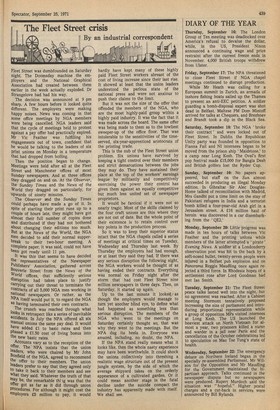The Fleet Street crisis
By an industrial correspondent
Fleet Street was dumbfounded on Saturday night. The Doomsday machine the em ployers and the National Graphical Association had created between them earlier in the week actually exploded. Dr Strangelove had had his way.
The decision was announced at 9 pm sharp. A few hours before it looked quite different. The employers were making happy noises. News was coming in that some office meetings by NGA members were being cancelled. NGA leaders said that the cycle of meetings held to protest against a pay offer had practically expired.
Mr Vic Feather was fulfilling his engagements out of town, confident that he would be talking to the leaders of six Print unions on Monday in a temperature that had dropped from boiling.
Then the position began to change. Meetings were held after all at the Fleet Street and Manchester offices of most Sunday newspapers. And at three offices they dragged on and on. At the Observer, the Sunday Times and the News .of the World they dragged on particularly, for Upwards of ninety minutes.
The Observer and the Sunday Times could perhaps have made a go of it. In Spite of starting their print runs up to a couple of hours late, they might have got almost their full number of copies done and distributed if they had not bothered about changing their editions too much. But at the News of the World, the NGA Men decided to add their normal supperbreak to their two-hour meeting. A complete paper, it was said, could not have been got ready until 11 pm. It was this that seems to have decided the representatives of the Newspaper Publishers Association, gathered across Bouverie •Street from the News of the World offices, that sufficiently serious disruption had taken place to justify carrying out their threat to terminate the contracts of all 5,000 NGA men working in national newspapers. Or rather, as the NPA itself would put it, to regard the NGA as having terminated their own contracts. The crunch was reached through what looks in retrospect like a series of inevitable accidents. In July the NPA offered all six manual unions the same pay deal. It would have added £1 to basic rates and then Phased a £1.50 cost of living bonus into the new basic rates. Accounts vary as to the reception of the offer. The NPA insists that the union leaders, who were chaired by Mr John Bonfield of the NGA, agreed to recommend the offer to their members. The union leaders prefer to say that they agreed only tO take it back to their members and see What they said. Whatever the truth of that may be, the remarkable thi g was that the offer got as far as it did through union Procedures. For although it might cost the employers £5 million to pay, it would hardly have kept many of these highly paid Fleet Street workers abreast of the cost of living increase since their last rise. It showed at least that the union leaders understood the parlous state of the national press and were not anxious to push their claims to the limit.
But it was not the size of the offer that offended the members of the NGA, who are the most highly-paid group within a highly paid industry. It was the fact that it was made across the board. The same offer was being made to them as to the lowliest sweeper-up of the office floor. That was intolerable to the sensitivities of the timeserved, six-year-apprenticed aristocrats of the printing trade.
This is the nub of the Fleet Street union problem. Six unions have survived by keeping a tight control over their members and strict demarcations between the jobs they may do. They have sustained their place at the top of the workers' earnings league by militantly and competitively exercising the power their control has given them against an equally competitive but much less united set of newspaper proprietors.
It would be farcical if it were not so nearly tragic. Most of the skills claimed by the four craft unions are thin where they are not out of date. But the whole point of their existence is to retain control over key points in the production process.
So it was to keep their superior status intact that the NGA chapels called a series of meetings at critical times on Tuesday, Wednesday and Thursday last week. By Thursday the employers had had enough, or at least they said they had. If there was any serious disruption the following night, the NGA workers would be thought of as having ended their contracts. Everything was normal on Friday night after the storm that had cost Fleet Street nine million newspapers in three days. Then, on Saturday, it started up again.
Up to the last minute it looked as though the employers would manage to turn yet another blind eye, to define what had happened as something less than serious disruption. The members of the NGA who went to the meetings on Saturday certainly thought so; that was why they went to the meetings. But the NPA dug its heels in. Everyone was amazed, including, no doubt, the NPA.
If the NPA stand really means what it looks like, then the whole nasty experience may have been worthwhile. It could shock the unions collectively into threshing a realistic wage structure out of the present jungle system, by the side of which the average shipyard takes on the orderly appearance of a cultivated garden. Or it could mean another stage in the fatal decline under the suicide compact the industry has apparently made with itself. We shall see.


































 Previous page
Previous page